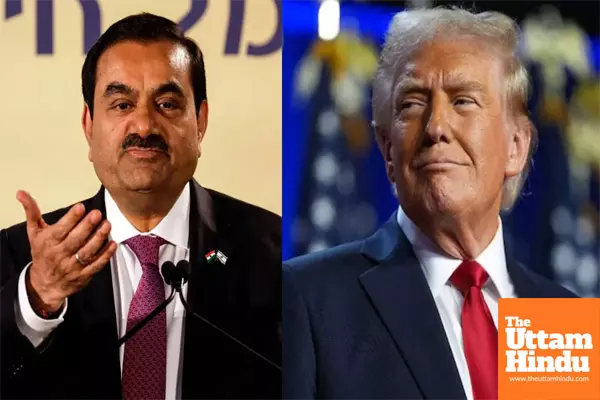
Trump's Decision to Revoke Foreign Corrupt Practices Act Signals Big Relief for Adani

New Delhi (The Uttam Hindu): In a significant move aimed at enhancing U.S. economic competitiveness, President Donald Trump has issued an executive order directing the U.S. Department of Justice to pause enforcement of the Foreign Corrupt Practices Act (FCPA) of 1977. The decision, which was signed at midnight on Monday, is expected to have far-reaching implications for both U.S. businesses and foreign companies under investigation for violations of the anti-bribery law, including India’s prominent Adani Group. The FCPA, a cornerstone of U.S. anti-corruption efforts, prohibits American companies from offering bribes to foreign officials to secure business deals abroad. Under this law, the Adani Group had been under investigation for allegedly engaging in corrupt practices to secure renewable energy contracts in India. The investigation focused on the claim that the company had paid hefty bribes to Indian government officials to acquire solar energy projects.
**Adani Group’s Potential Relief**: The decision to ease FCPA enforcement comes as a major relief for Gautam Adani and his company, which has been under scrutiny for months over corruption allegations tied to the FCPA. The U.S. Department of Justice had initiated an investigation in response to allegations that Adani Group executives, including Gautam Adani, offered a bribe of over ₹2,100 crores (approximately $265 million) to secure contracts for renewable energy projects. With Trump’s order, these investigations are likely to be paused, and the case against the Adani Group could eventually be dismissed. The move has already been met with positive reactions in the market, with shares of Adani Group companies rising by up to 4.5%. This surge is indicative of investor confidence following the expected closure of the case.
**Trump’s Rationale for the Decision**: President Trump has long criticized the FCPA, claiming that its stringent enforcement has placed American companies at a competitive disadvantage. In his latest order, Trump emphasized that the law, which was initially passed to curb corruption in international business dealings, has become a hindrance to American companies trying to expand globally. He stated that it not only limits the ability of U.S. companies to compete but also subjects them to unfair scrutiny from foreign governments. Trump’s decision to ease FCPA enforcement aligns with his broader policy agenda to reduce regulatory burdens on businesses and promote American economic growth. The order seeks to create a more business-friendly environment, particularly for companies that operate in regions where bribery and corruption are part of the local business culture.
**The Global Implications of the Executive Order**: While the order does not repeal the FCPA outright, it marks a significant shift in its application. The Department of Justice is now tasked with revising enforcement guidelines, which will likely focus on prioritizing only the most egregious cases of corruption. The move will offer relief not only to the Adani Group but also to other companies facing similar allegations under the FCPA. This decision is expected to benefit various multinational corporations and foreign firms, especially those operating in emerging markets where corruption may be more prevalent. However, critics argue that the move could undermine global anti-corruption efforts and lead to an increase in unethical business practices.
**Legal Experts Weigh In**: Legal experts have weighed in on the potential consequences of this shift. While some view it as a positive step for U.S. businesses, others express concerns that it could weaken the integrity of global anti-bribery laws. The FCPA has been instrumental in curbing corruption worldwide, and its relaxation could send the wrong message to international markets. Additionally, the revised guidelines could potentially complicate future investigations into companies engaging in corrupt practices.
**Looking Ahead: Impact on the Adani Group**: For the Adani Group, Trump’s decision offers a clear path to legal relief. The company, which was already facing intense scrutiny from U.S. lawmakers and regulators, is likely to see the charges against it dismissed as a result of the pause in FCPA enforcement. Adani’s legal team has expressed satisfaction with the decision, which aligns with their efforts to combat what they have referred to as politically motivated investigations. However, while the case against the Adani Group may be closed, the global scrutiny on the company will likely continue. Indian lawmakers and business leaders have expressed their concerns over the potential for such cases to harm India’s reputation in the international business community.
President Trump’s executive order marks a pivotal moment in the ongoing debate over U.S. anti-corruption laws and their impact on international business. For Gautam Adani and the Adani Group, it represents a significant legal victory, with the case against them likely to be dismissed. As the U.S. moves forward with this shift in policy, the broader implications for global anti-corruption efforts and the future of multinational business will remain a topic of discussion. While the immediate relief is evident for the Adani Group, the long-term effects of this policy change on American companies and global business practices are yet to be fully realized. With Trump’s order, the landscape of international business and its regulation is poised for a major shift.

